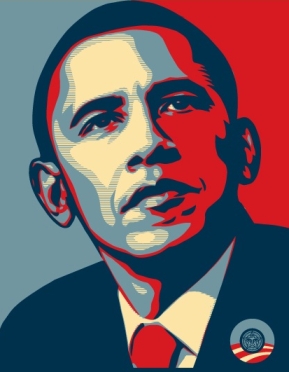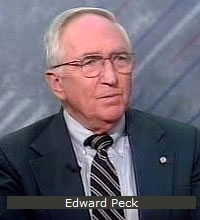The all-white elephant in the room
Bored by those endless replays of the Rev. Jeremiah Wright? If so, go directly to YouTube, search for “John Hagee Roman Church Hitler,” and be recharged by a fresh jolt of clerical jive.
What you’ll find is a white televangelist, the Rev. John Hagee, lecturing in front of an enormous diorama. Wielding a pointer, he pokes at the image of a woman with Pamela Anderson-sized breasts, her hand raising a golden chalice. The woman is “the Great Whore,” Mr. Hagee explains, and she is drinking “the blood of the Jewish people.” That’s because the Great Whore represents “the Roman Church,” which, in his view, has thirsted for Jewish blood throughout history, from the Crusades to the Holocaust.
Mr. Hagee is not a fringe kook but the pastor of a Texas megachurch. On Feb. 27, he stood with John McCain and endorsed him over the religious conservatives’ favorite, Mike Huckabee, who was then still in the race. [complete article]
I once asked a reporter back from Vietnam, “Who’s telling the truth over there?” “Everyone, he said. “Everyone sees what’s happening through the lens of their own experience.” That’s how people see Jeremiah Wright. In my conversation with him on this broadcast a week ago and in his dramatic public appearances since, he revealed himself to be far more complex than the sound bites that propelled him onto the public stage. Over 2000 of you have written me about him, and your opinions vary widely. Some sting: “Jeremiah Wright is nothing more than a race-hustling, American hating radical,” one viewer wrote. A “nut case,” said another. Others were far more were sympathetic to him.
Many of you have asked for some rational explanation for Wright’s transition from reasonable conversation to shocking anger at the National Press Club. A psychologist might pull back some of the layers and see this complicated man more clearly, but I’m not a psychologist. Many black preachers I’ve known — scholarly, smart, and gentle in person — uncorked fire and brimstone in the pulpit. Of course I’ve known many white preachers like that, too.
But where I grew up in the south, before the civil rights movement, the pulpit was a safe place for black men to express anger for which they would have been punished anywhere else; a safe place for the fierce thunder of dignity denied, justice delayed. I think I would have been angry if my ancestors had been transported thousands of miles in the hellish hole of a slave ship, then sold at auction, humiliated, whipped, and lynched. Or if my great-great grandfather had been but three-fifths of a person in a constitution that proclaimed, “We the people.” Or if my own parents had been subjected to the racial vitriol of Jim Crow, Strom Thurmond, Bull Connor, and Jesse Helms. Even so, the anger of black preachers I’ve known and heard about and reported on was, for them, very personal and cathartic. [complete article]
Editor’s Comment — At this point, the media’s lack of interest in Hagee is proportionate to its lack of interest in McCain. The election story for now is above all else the Clinton-Obama fight. And this begs a different question on double standards: Why has the Doug Coe/The Fellowship story been so resolutely ignored?
It hasn’t even generated that much interest in the hyper-reactive blogosphere, and even when NBC News picked up the story a month ago, no one followed. Is it because delving into The Fellowship is going to open up such a big can of worms that involves so many leading figures from both parties that no one wants to take the risk? Or is it because The Fellowship has inserted itself so deeply into the establishment that its powerful defenders make it well nigh invulnerable to public scrutiny?
Obama has been pummeled with questions about his relationship with Wright. Isn’t it time for Hillary to answer a few on what she thinks about Doug Coe’s views on Hitler’s approach to leadership?
One last thought on the Wright issue: Everyone is a captive of their own form of parochiality and in one respect, Jeremiah Wright is in the same company as the Pope and the Archbishop of Canterbury. Each has demonstrated an apparent ineptness in handling the media, but the explanation for why they could so easily be misrepresented may be quite obvious: The privilege of those who preach is that they can expect an attentive audience, willing to listen to fully formed statements that take an hour to hear and several more to digest. They have polished their communication skills in a form that does not lend itself to the reductions that the media demands.

 here were signs that Obama’s hard work and extensive television advertising were paying off: various polls showed the race tightening a bit. The talk-show muttering had migrated from Jeremiah Wright to Clinton’s Bosnian sniper-fire fantasy. Hordes of new voters were registering in Pennsylvania. It was not impossible that Obama would turn Clinton’s predicted victory into a closer-than-expected moral defeat.
here were signs that Obama’s hard work and extensive television advertising were paying off: various polls showed the race tightening a bit. The talk-show muttering had migrated from Jeremiah Wright to Clinton’s Bosnian sniper-fire fantasy. Hordes of new voters were registering in Pennsylvania. It was not impossible that Obama would turn Clinton’s predicted victory into a closer-than-expected moral defeat. Rev Wright was telling his congregation, pay attention to this white man,
Rev Wright was telling his congregation, pay attention to this white man,